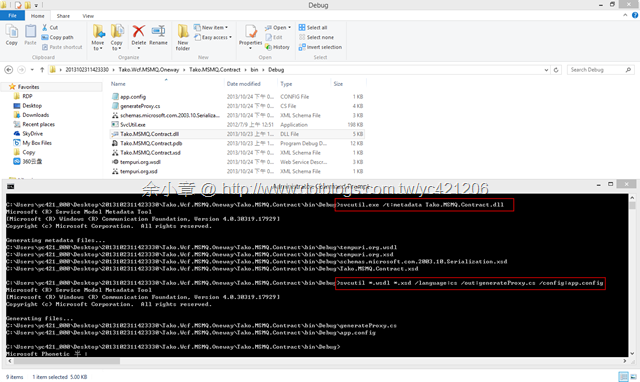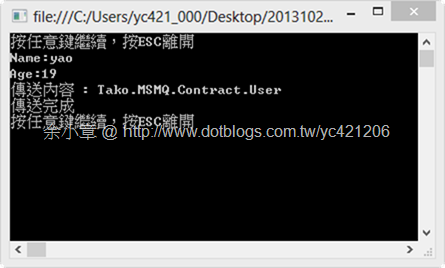[WCF] 使用 svcutil.exe 產生合約 Client 程式碼
svcutil.exe 的位置在
@Windows 8 x86 / .Net 4.0
C:\Program Files (x86)\Microsoft SDKs\Windows\v8.0A\bin\NETFX 4.0 Tools
得依照不同的 .NET 版本 使用svcutil.exe
更詳細的內容請參考:
http://msdn.microsoft.com/zh-tw/library/aa347733
我用上篇的範例做演練 http://www.dotblogs.com.tw/yc421206/archive/2013/10/23/125276.aspx
操作步驟如下:
1.我先將 svcutil.exe 檔案 copy 到目標目錄
2.用管理員身份執行cmd
3.產生 Metadata
svcutil.exe /t:metadata Tako.MSMQ.Contract.dll
4.產生代理程式碼及設定檔
svcutil *.wsdl *.xsd /language:cs /out:generateProxy.cs /config:app.config
執行結果如下圖:
產生出來的程式碼如下,不過我只需要 Service1Client 類別,其餘的只需要參考 Tako.MSMQ.Contract.dll 就會有了,觀察一下 Service1Client 類別的寫法其實也不難自己實作也是相當的容易
只要覆寫原本 4 個建構子即可
// <auto-generated> // This code was generated by a tool. // Runtime Version:4.0.30319.18051 // // Changes to this file may cause incorrect behavior and will be lost if // the code is regenerated. // </auto-generated> //------------------------------------------------------------------------------ namespace Tako.MSMQ.Contract { using System.Runtime.Serialization; [System.Diagnostics.DebuggerStepThroughAttribute()] [System.CodeDom.Compiler.GeneratedCodeAttribute("System.Runtime.Serialization", "4.0.0.0")] [System.Runtime.Serialization.DataContractAttribute(Name="User", Namespace="http://schemas.datacontract.org/2004/07/Tako.MSMQ.Contract")] public partial class User : object, System.Runtime.Serialization.IExtensibleDataObject { private System.Runtime.Serialization.ExtensionDataObject extensionDataField; private int AgeField; private string NameField; public System.Runtime.Serialization.ExtensionDataObject ExtensionData { get { return this.extensionDataField; } set { this.extensionDataField = value; } } [System.Runtime.Serialization.DataMemberAttribute()] public int Age { get { return this.AgeField; } set { this.AgeField = value; } } [System.Runtime.Serialization.DataMemberAttribute()] public string Name { get { return this.NameField; } set { this.NameField = value; } } } } [System.CodeDom.Compiler.GeneratedCodeAttribute("System.ServiceModel", "4.0.0.0")] [System.ServiceModel.ServiceContractAttribute(ConfigurationName="IService1")] public interface IService1 { [System.ServiceModel.OperationContractAttribute(IsOneWay=true, Action="http://tempuri.org/IService1/SendUser")] void SendUser(Tako.MSMQ.Contract.User user); [System.ServiceModel.OperationContractAttribute(IsOneWay=true, Action="http://tempuri.org/IService1/SendUser")] System.Threading.Tasks.Task SendUserAsync(Tako.MSMQ.Contract.User user); } [System.CodeDom.Compiler.GeneratedCodeAttribute("System.ServiceModel", "4.0.0.0")] public interface IService1Channel : IService1, System.ServiceModel.IClientChannel { } [System.Diagnostics.DebuggerStepThroughAttribute()] [System.CodeDom.Compiler.GeneratedCodeAttribute("System.ServiceModel", "4.0.0.0")] public partial class Service1Client : System.ServiceModel.ClientBase<IService1>, IService1 { public Service1Client() { } public Service1Client(string endpointConfigurationName) : base(endpointConfigurationName) { } public Service1Client(string endpointConfigurationName, string remoteAddress) : base(endpointConfigurationName, remoteAddress) { } public Service1Client(string endpointConfigurationName, System.ServiceModel.EndpointAddress remoteAddress) : base(endpointConfigurationName, remoteAddress) { } public Service1Client(System.ServiceModel.Channels.Binding binding, System.ServiceModel.EndpointAddress remoteAddress) : base(binding, remoteAddress) { } public void SendUser(Tako.MSMQ.Contract.User user) { base.Channel.SendUser(user); } public System.Threading.Tasks.Task SendUserAsync(Tako.MSMQ.Contract.User user) { return base.Channel.SendUserAsync(user); } }
1.把產生好的 generateProxy.cs 加入到 Client 專案
2.並換掉原本的 proxy 寫法
{ //ChannelFactory<IService1> proxy = new ChannelFactory<IService1>("netMsmqBinding.Service1"); //proxy.Open(); //IService1 channel = proxy.CreateChannel(); Service1Client proxy = new Service1Client(); label1: Console.Write("按任意鍵繼續,按ESC離開"); var key = Console.ReadKey(true); if (key.Key == ConsoleKey.Escape) { Console.WriteLine("再會~!"); proxy.Close(); Console.ReadLine(); return; } Console.WriteLine(""); Console.Write("Name:"); string name = Console.ReadLine(); Console.Write("Age:"); string age = Console.ReadLine(); var user = new User() { Name = name, Age = int.Parse(age) }; Console.WriteLine("傳送內容 : " + user); //channel.SendUser(user); proxy.SendUser(user); Console.WriteLine("傳送完成"); goto label1; }運行結果如下:
文章出自:http://www.dotblogs.com.tw/yc421206/archive/2013/10/24/125428.aspx
若有謬誤,煩請告知,新手發帖請多包涵
Microsoft MVP Award 2010~2017 C# 第四季
Microsoft MVP Award 2018~2022 .NET


